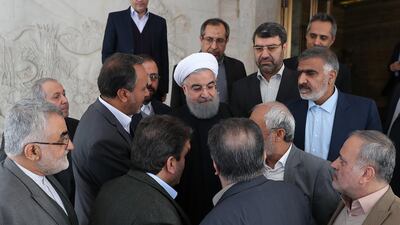Iran's parliament voted on Sunday to suspend discussions about joining the UN Terrorism Financing Convention for two months, while it waits to see whether its nuclear deal with world powers will survive.
There has been an often furious debate among Iranian politicians over whether to join the international Financial Action Task Force (FATF), which requires members to pass numerous laws against the financing of terrorism and money laundering.
Iran and North Korea are currently the only countries on the FATF blacklist, adding to their difficulties in accessing global banking.
But many conservative politicians argue the new laws, in the works since last year, will cut off Iranian support to Lebanese Hezbollah and Palestinian Hamas - whose military wings are designated as terrorist organisations by the United States and European Union, among others.
They say the legislation will also condemn members of the Revolutionary Guards listed as terrorists by the US, including the head of its external operations, Qassem Soleimani.
______________
Read more
Iran nuclear deal countries meet in Tehran
Putin criticises US withdrawal from Iranian nuclear deal
______________
But Abbas Araghchi, deputy foreign minister, defended the efforts to join the FATF, saying it was firmly in Iran's interests.
"This very parliament was the victim of Daesh terrorism this time last year," Mr Aragchi said.
"Without international co-operation and joining international conventions, it is impossible to confront it.
"Inside the country there are some holes and weaknesses in banking networks, which unfortunately facilitates terrorist groups and drug smuggling," he said.
Last June, ISIS carried out twin attacks on Iran's parliament and the tomb of revolutionary founder Ruhollah Khomeini, killing 17.
Iran, a majority Shiite country, is considered a primary enemy by Sunni extremist groups such as Al Qaeda and ISIS, and has directly fought these groups in Syria and Iraq.
But with the US pulling out of the 2015 nuclear deal last month and ordering full sanctions to be reimposed on Iran, many say it is pointless to join the FATF.
The other parties to the nuclear deal - Britain, France, Germany, China and Russia - are working to salvage the deal and maintain trade ties, but most international banks already refuse to work with Iran for fear of US penalties.
On Sunday, politicians voted 138 to 103 (with six abstentions) on suspending the discussion around the Terrorism Financing Convention for two months, while they wait to see how the nuclear deal discussions play out, according to ISNA.

